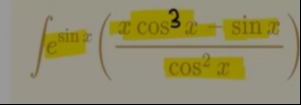Question
Question: $\int e^{\sin x}(\frac{x\cos^3x-\sin x}{\cos^2x})dx$...
∫esinx(cos2xxcos3x−sinx)dx

esinx(x−secx)+C
Solution
The given integral is: I=∫esinx(cos2xxcos3x−sinx)dx First, simplify the expression inside the parenthesis by splitting the fraction: cos2xxcos3x−sinx=cos2xxcos3x−cos2xsinx =xcosx−cosxsinx⋅cosx1 =xcosx−tanxsecx So the integral becomes: I=∫esinx(xcosx−tanxsecx)dx This integral is of the standard form ∫eg(x)(f′(x)+f(x)g′(x))dx=eg(x)f(x)+C. In this case, let g(x)=sinx. Then, g′(x)=cosx. We need to find a function f(x) such that f′(x)+f(x)g′(x) equals the term in the parenthesis, i.e., f′(x)+f(x)cosx=xcosx−tanxsecx.
Let's try to identify f(x). Consider f(x)=x−secx. Now, let's find f′(x): f′(x)=dxd(x−secx)=1−secxtanx Substitute f(x) and f′(x) into the expression f′(x)+f(x)cosx: (1−secxtanx)+(x−secx)cosx =1−secxtanx+xcosx−secxcosx Since secxcosx=cosx1⋅cosx=1, the expression simplifies to: =1−secxtanx+xcosx−1 =xcosx−secxtanx This matches the expression inside the parenthesis in the integral. Therefore, the integral is of the form ∫eg(x)(f′(x)+f(x)g′(x))dx with g(x)=sinx and f(x)=x−secx. The solution to the integral is eg(x)f(x)+C. I=esinx(x−secx)+C
The final answer is esinx(x−secx)+C.
Explanation of the solution:
- Simplify the integrand: The given integral ∫esinx(cos2xxcos3x−sinx)dx is simplified by splitting the fraction inside the parenthesis: ∫esinx(xcosx−tanxsecx)dx.
- Identify the pattern: This integral matches the form ∫eg(x)(f′(x)+f(x)g′(x))dx=eg(x)f(x)+C. Here, g(x)=sinx, so g′(x)=cosx.
- Find f(x): We need to find a function f(x) such that f′(x)+f(x)cosx=xcosx−tanxsecx. By inspection, we find that f(x)=x−secx.
- Verify: f′(x)=1−secxtanx.
- Then f′(x)+f(x)cosx=(1−secxtanx)+(x−secx)cosx=1−secxtanx+xcosx−1=xcosx−secxtanx, which matches the integrand.
- Apply the formula: Since f(x) and g(x) are identified, the integral evaluates to eg(x)f(x)+C=esinx(x−secx)+C.
Answer: esinx(x−secx)+C
